
Peng Chengzhi (2nd L) and his colleagues talk about their research in front of the Zuchongzhi 2, a 66-qubit programmable quantum computing system, in Shanghai Research Center for Quantum Science in east China's Shanghai, July 22, 2023. Peng Chengzhi, born in 1976, holds several professional positions: professor and doctoral supervisor at the University of Science and Technology of China (USTC), chief scientist of QuantumCTek Co., Ltd., and chief engineer of the scientific application system of Micius, the world's first quantum communication satellite.
Peng began to participate in the research of quantum science and technology in 2003. Since then, he has taken part in the whole process of the design of the quantum satellite "Micius", witnessing the development of China in the fields of quantum communication, quantum computing and others.
Since the USTC and QuantumCTek Co., Ltd are based in Hefei, while the Shanghai Institute for Advance Studies of USTC and Shanghai Research Center for Quantum Science are located in Shanghai, Peng often travels between the two cities for work and living.
The Yangtze River Delta integration drives the flows of talents and technologies, and provides impetus for the development of science and technology. Taking advantages of the Yangtze River Delta integration, Peng and his team are making full efforts to prepare for the launch of a new quantum satellite. (Xinhua/Qian Yi)
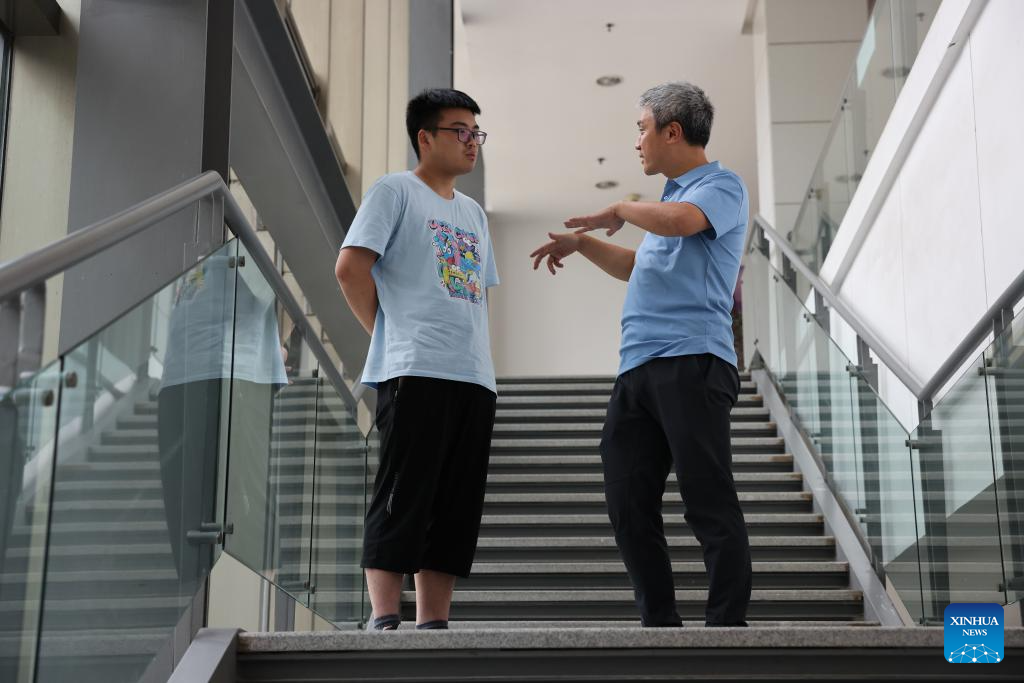
Peng Chengzhi (R) talks with a student after a lecture in the University of Science and Technology of China in Hefei, east China's Anhui Province, July 21, 2023. Peng Chengzhi, born in 1976, holds several professional positions: professor and doctoral supervisor at the University of Science and Technology of China (USTC), chief scientist of QuantumCTek Co., Ltd., and chief engineer of the scientific application system of Micius, the world's first quantum communication satellite.
Peng began to participate in the research of quantum science and technology in 2003. Since then, he has taken part in the whole process of the design of the quantum satellite "Micius", witnessing the development of China in the fields of quantum communication, quantum computing and others.
Since the USTC and QuantumCTek Co., Ltd are based in Hefei, while the Shanghai Institute for Advance Studies of USTC and Shanghai Research Center for Quantum Science are located in Shanghai, Peng often travels between the two cities for work and living.
The Yangtze River Delta integration drives the flows of talents and technologies, and provides impetus for the development of science and technology. Taking advantages of the Yangtze River Delta integration, Peng and his team are making full efforts to prepare for the launch of a new quantum satellite. (Xinhua/Jin Liwang)
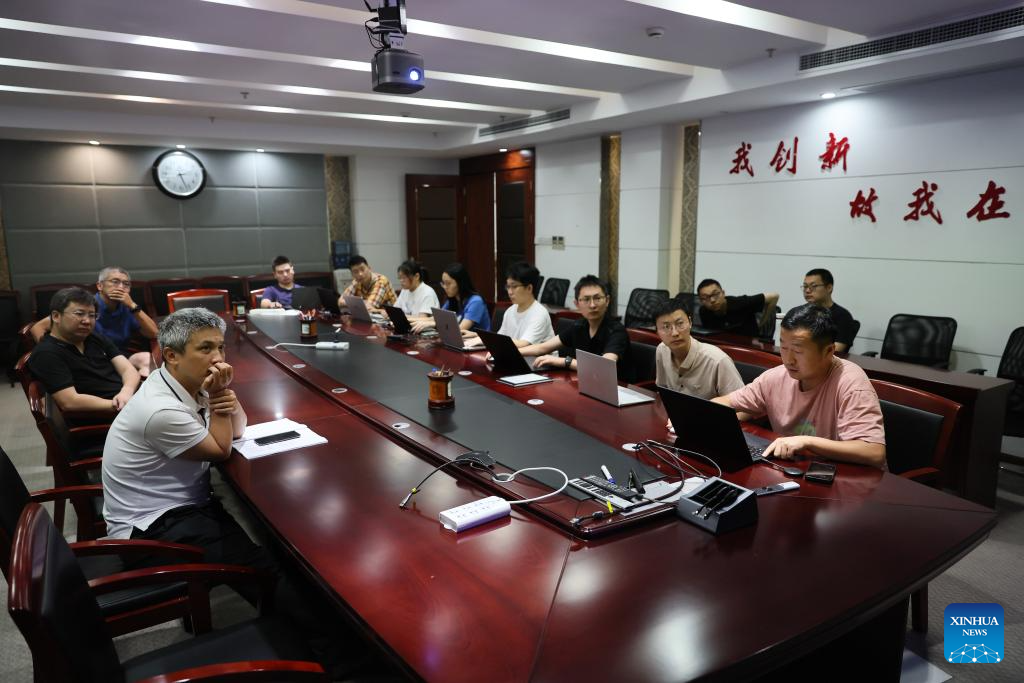
Peng Chengzhi (L front) attends a meeting at the Shanghai Institute for Advance Studies of the University of Science and Technology of China in east China's Shanghai, July 22, 2023. Peng Chengzhi, born in 1976, holds several professional positions: professor and doctoral supervisor at the University of Science and Technology of China (USTC), chief scientist of QuantumCTek Co., Ltd., and chief engineer of the scientific application system of Micius, the world's first quantum communication satellite.
Peng began to participate in the research of quantum science and technology in 2003. Since then, he has taken part in the whole process of the design of the quantum satellite "Micius", witnessing the development of China in the fields of quantum communication, quantum computing and others.
Since the USTC and QuantumCTek Co., Ltd are based in Hefei, while the Shanghai Institute for Advance Studies of USTC and Shanghai Research Center for Quantum Science are located in Shanghai, Peng often travels between the two cities for work and living.
The Yangtze River Delta integration drives the flows of talents and technologies, and provides impetus for the development of science and technology. Taking advantages of the Yangtze River Delta integration, Peng and his team are making full efforts to prepare for the launch of a new quantum satellite. (Xinhua/Wang Xiang)
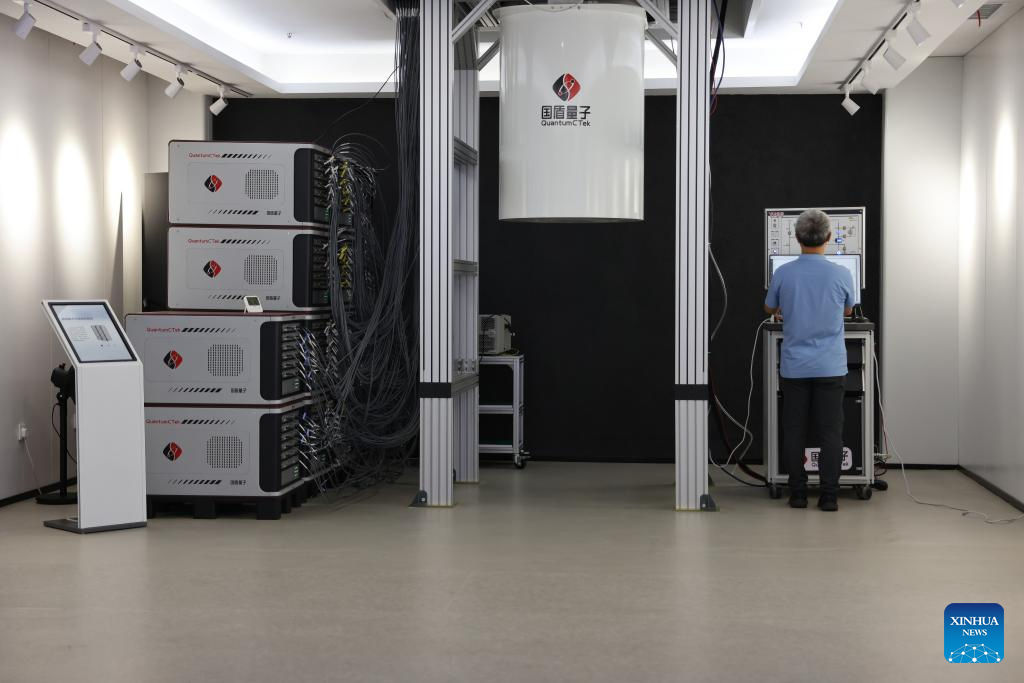
Peng Chengzhi operates Zuchongzhi 2, a 66-qubit programmable quantum computing system, at QuantumCTek Co., Ltd in Hefei, east China's Anhui Province, July 21, 2023. Peng Chengzhi, born in 1976, holds several professional positions: professor and doctoral supervisor at the University of Science and Technology of China (USTC), chief scientist of QuantumCTek Co., Ltd., and chief engineer of the scientific application system of Micius, the world's first quantum communication satellite.
Peng began to participate in the research of quantum science and technology in 2003. Since then, he has taken part in the whole process of the design of the quantum satellite "Micius", witnessing the development of China in the fields of quantum communication, quantum computing and others.
Since the USTC and QuantumCTek Co., Ltd are based in Hefei, while the Shanghai Institute for Advance Studies of USTC and Shanghai Research Center for Quantum Science are located in Shanghai, Peng often travels between the two cities for work and living.
The Yangtze River Delta integration drives the flows of talents and technologies, and provides impetus for the development of science and technology. Taking advantages of the Yangtze River Delta integration, Peng and his team are making full efforts to prepare for the launch of a new quantum satellite. (Xinhua/Jin Liwang)

Peng Chengzhi walks alongside a river in Pudong District of east China's Shanghai, July 22, 2023. Peng Chengzhi, born in 1976, holds several professional positions: professor and doctoral supervisor at the University of Science and Technology of China (USTC), chief scientist of QuantumCTek Co., Ltd., and chief engineer of the scientific application system of Micius, the world's first quantum communication satellite.
Peng began to participate in the research of quantum science and technology in 2003. Since then, he has taken part in the whole process of the design of the quantum satellite "Micius", witnessing the development of China in the fields of quantum communication, quantum computing and others.
Since the USTC and QuantumCTek Co., Ltd are based in Hefei, while the Shanghai Institute for Advance Studies of USTC and Shanghai Research Center for Quantum Science are located in Shanghai, Peng often travels between the two cities for work and living.
The Yangtze River Delta integration drives the flows of talents and technologies, and provides impetus for the development of science and technology. Taking advantages of the Yangtze River Delta integration, Peng and his team are making full efforts to prepare for the launch of a new quantum satellite. (Xinhua/Jin Liwang)

Peng Chengzhi (L) talks with Professor Ren Jigang at the Institute of Advance Technology of the University of Science and Technology of China in Hefei, east China's Anhui Province, July 21, 2023. Peng Chengzhi, born in 1976, holds several professional positions: professor and doctoral supervisor at the University of Science and Technology of China (USTC), chief scientist of QuantumCTek Co., Ltd., and chief engineer of the scientific application system of Micius, the world's first quantum communication satellite.
Peng began to participate in the research of quantum science and technology in 2003. Since then, he has taken part in the whole process of the design of the quantum satellite "Micius", witnessing the development of China in the fields of quantum communication, quantum computing and others.
Since the USTC and QuantumCTek Co., Ltd are based in Hefei, while the Shanghai Institute for Advance Studies of USTC and Shanghai Research Center for Quantum Science are located in Shanghai, Peng often travels between the two cities for work and living.
The Yangtze River Delta integration drives the flows of talents and technologies, and provides impetus for the development of science and technology. Taking advantages of the Yangtze River Delta integration, Peng and his team are making full efforts to prepare for the launch of a new quantum satellite. (Xinhua/Jin Liwang)
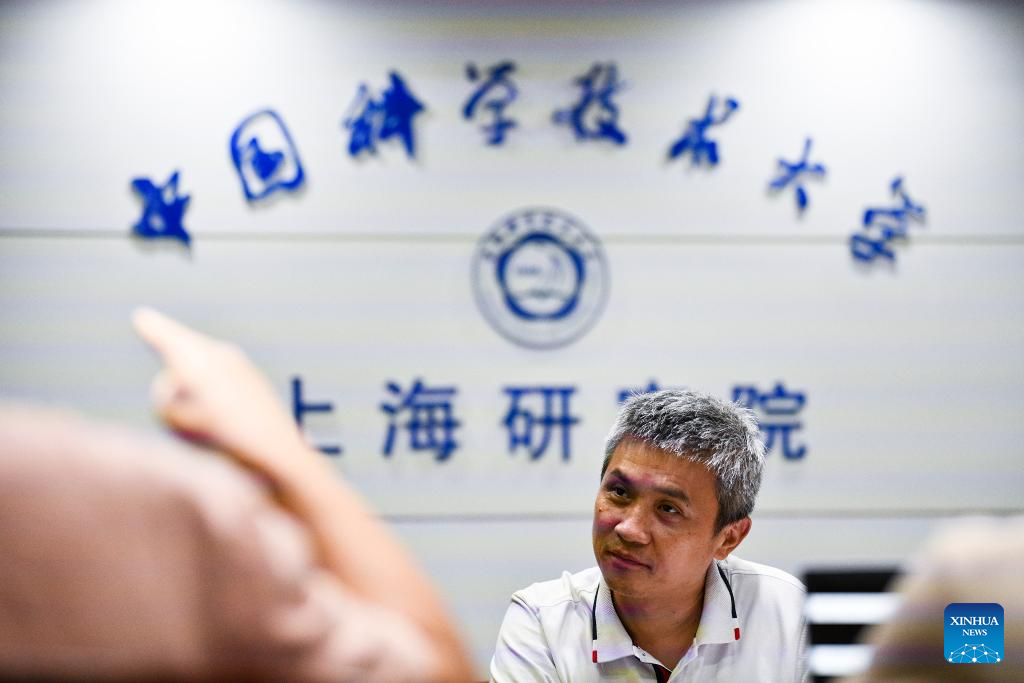
Peng Chengzhi listens to a report during a meeting at the Shanghai Institute for Advance Studies of the University of Science and Technology of China in east China's Shanghai, July 22, 2023. Peng Chengzhi, born in 1976, holds several professional positions: professor and doctoral supervisor at the University of Science and Technology of China (USTC), chief scientist of QuantumCTek Co., Ltd., and chief engineer of the scientific application system of Micius, the world's first quantum communication satellite.
Peng began to participate in the research of quantum science and technology in 2003. Since then, he has taken part in the whole process of the design of the quantum satellite "Micius", witnessing the development of China in the fields of quantum communication, quantum computing and others.
Since the USTC and QuantumCTek Co., Ltd are based in Hefei, while the Shanghai Institute for Advance Studies of USTC and Shanghai Research Center for Quantum Science are located in Shanghai, Peng often travels between the two cities for work and living.
The Yangtze River Delta integration drives the flows of talents and technologies, and provides impetus for the development of science and technology. Taking advantages of the Yangtze River Delta integration, Peng and his team are making full efforts to prepare for the launch of a new quantum satellite. (Xinhua/Qian Yi)
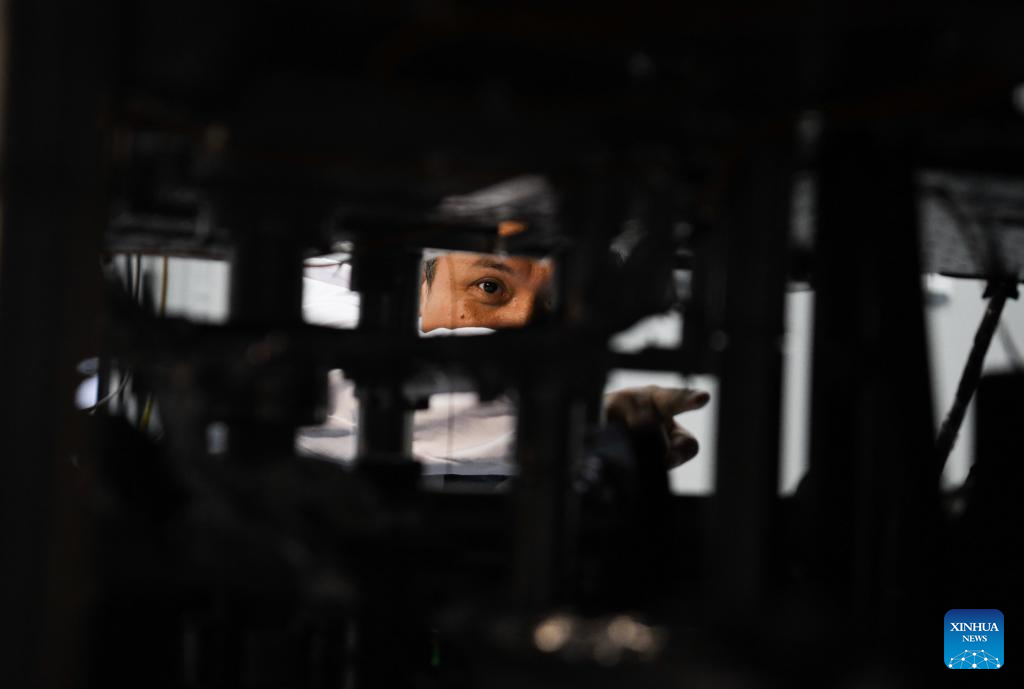
Peng Chengzhi talks with a student at a laboratory in the University of Science and Technology of China in Hefei, east China's Anhui Province, July 21, 2023. Peng Chengzhi, born in 1976, holds several professional positions: professor and doctoral supervisor at the University of Science and Technology of China (USTC), chief scientist of QuantumCTek Co., Ltd., and chief engineer of the scientific application system of Micius, the world's first quantum communication satellite.
Peng began to participate in the research of quantum science and technology in 2003. Since then, he has taken part in the whole process of the design of the quantum satellite "Micius", witnessing the development of China in the fields of quantum communication, quantum computing and others.
Since the USTC and QuantumCTek Co., Ltd are based in Hefei, while the Shanghai Institute for Advance Studies of USTC and Shanghai Research Center for Quantum Science are located in Shanghai, Peng often travels between the two cities for work and living.
The Yangtze River Delta integration drives the flows of talents and technologies, and provides impetus for the development of science and technology. Taking advantages of the Yangtze River Delta integration, Peng and his team are making full efforts to prepare for the launch of a new quantum satellite. (Xinhua/Zhang Duan)

Peng Chengzhi speaks during a lecture in the University of Science and Technology of China in Hefei, east China's Anhui Province, July 21, 2023. Peng Chengzhi, born in 1976, holds several professional positions: professor and doctoral supervisor at the University of Science and Technology of China (USTC), chief scientist of QuantumCTek Co., Ltd., and chief engineer of the scientific application system of Micius, the world's first quantum communication satellite.
Peng began to participate in the research of quantum science and technology in 2003. Since then, he has taken part in the whole process of the design of the quantum satellite "Micius", witnessing the development of China in the fields of quantum communication, quantum computing and others.
Since the USTC and QuantumCTek Co., Ltd are based in Hefei, while the Shanghai Institute for Advance Studies of USTC and Shanghai Research Center for Quantum Science are located in Shanghai, Peng often travels between the two cities for work and living.
The Yangtze River Delta integration drives the flows of talents and technologies, and provides impetus for the development of science and technology. Taking advantages of the Yangtze River Delta integration, Peng and his team are making full efforts to prepare for the launch of a new quantum satellite. (Xinhua/Qian Yi)
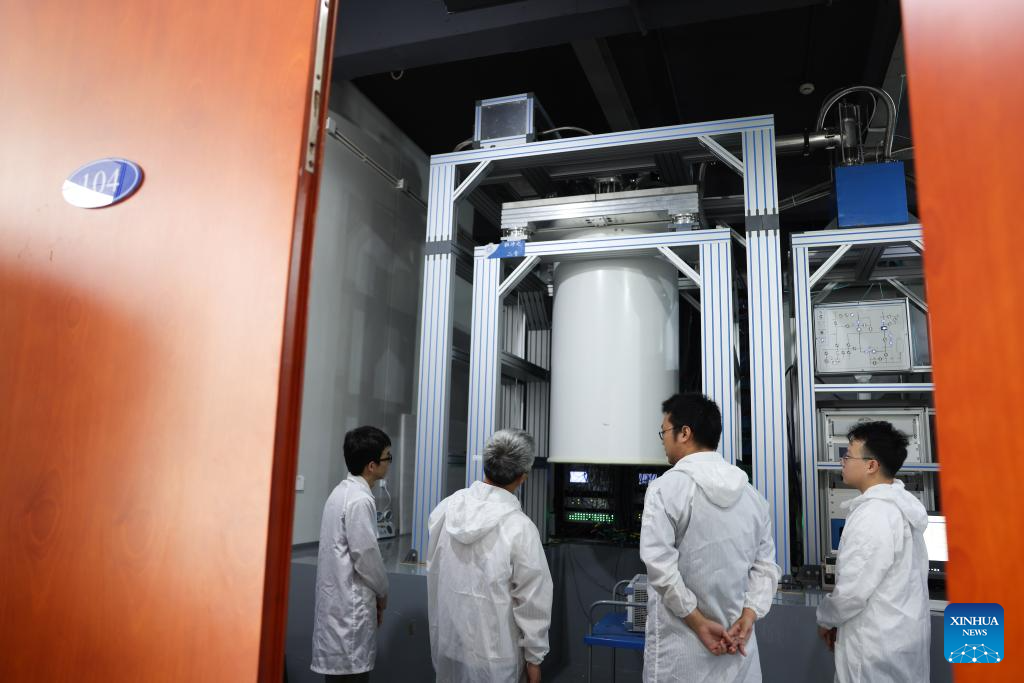
Peng Chengzhi (2nd L) and his colleagues talk about their research in front of the Zuchongzhi 2, a 66-qubit programmable quantum computing system, in Shanghai Research Center for Quantum Science in east China's Shanghai, July 22, 2023. Peng Chengzhi, born in 1976, holds several professional positions: professor and doctoral supervisor at the University of Science and Technology of China (USTC), chief scientist of QuantumCTek Co., Ltd., and chief engineer of the scientific application system of Micius, the world's first quantum communication satellite.
Peng began to participate in the research of quantum science and technology in 2003. Since then, he has taken part in the whole process of the design of the quantum satellite "Micius", witnessing the development of China in the fields of quantum communication, quantum computing and others.
Since the USTC and QuantumCTek Co., Ltd are based in Hefei, while the Shanghai Institute for Advance Studies of USTC and Shanghai Research Center for Quantum Science are located in Shanghai, Peng often travels between the two cities for work and living.
The Yangtze River Delta integration drives the flows of talents and technologies, and provides impetus for the development of science and technology. Taking advantages of the Yangtze River Delta integration, Peng and his team are making full efforts to prepare for the launch of a new quantum satellite. (Xinhua/Jin Liwang)
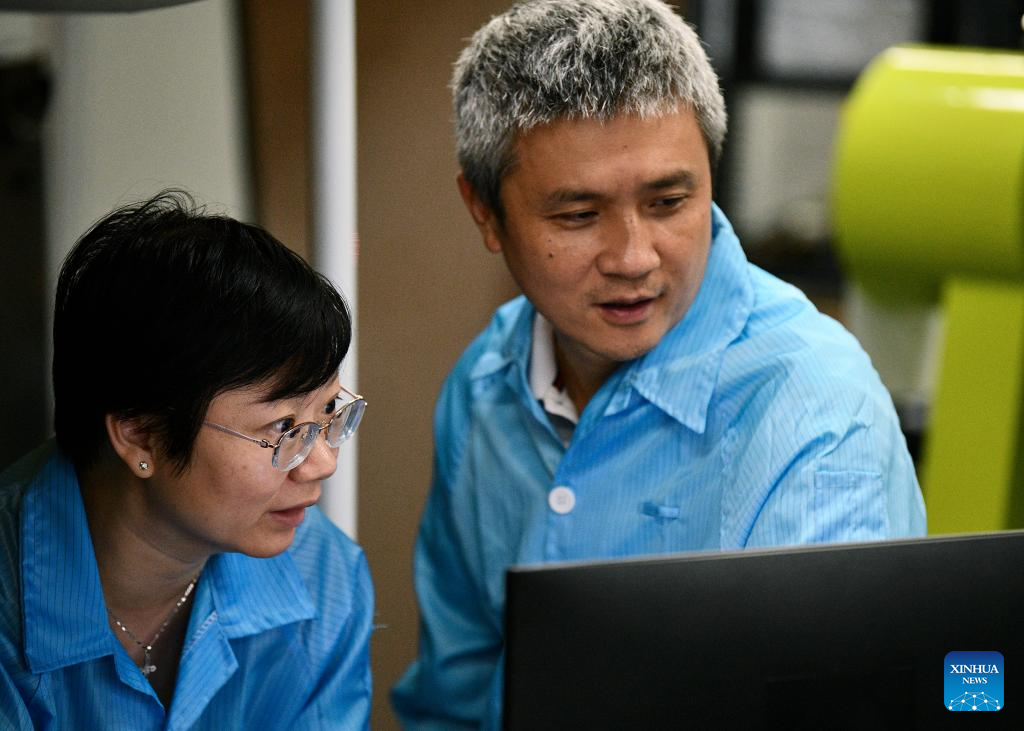
Peng Chengzhi (R) checks experimental data with Professor Yin Juan at a laboratory of the Shanghai Institute for Advance Studies of the University of Science and Technology of China in east China's Shanghai, July 22, 2023. Peng Chengzhi, born in 1976, holds several professional positions: professor and doctoral supervisor at the University of Science and Technology of China (USTC), chief scientist of QuantumCTek Co., Ltd., and chief engineer of the scientific application system of Micius, the world's first quantum communication satellite.
Peng began to participate in the research of quantum science and technology in 2003. Since then, he has taken part in the whole process of the design of the quantum satellite "Micius", witnessing the development of China in the fields of quantum communication, quantum computing and others.
Since the USTC and QuantumCTek Co., Ltd are based in Hefei, while the Shanghai Institute for Advance Studies of USTC and Shanghai Research Center for Quantum Science are located in Shanghai, Peng often travels between the two cities for work and living.
The Yangtze River Delta integration drives the flows of talents and technologies, and provides impetus for the development of science and technology. Taking advantages of the Yangtze River Delta integration, Peng and his team are making full efforts to prepare for the launch of a new quantum satellite. (Xinhua/Qian Yi)

Peng Chengzhi (1st R, back), Pan Jianwei (2nd R, front), Wang Jianyu (1st L, front), Yin Juan (2nd R, back) and Ren Jigang (3rd R, back) look at data received from quantum satellite "Micius" at Lijiang observatory in Lijiang city, southwest China's Yunnan Province, Dec. 22, 2016. Peng Chengzhi, born in 1976, holds several professional positions: professor and doctoral supervisor at the University of Science and Technology of China (USTC), chief scientist of QuantumCTek Co., Ltd., and chief engineer of the scientific application system of Micius, the world's first quantum communication satellite.
Peng began to participate in the research of quantum science and technology in 2003. Since then, he has taken part in the whole process of the design of the quantum satellite "Micius", witnessing the development of China in the fields of quantum communication, quantum computing and others.
Since the USTC and QuantumCTek Co., Ltd are based in Hefei, while the Shanghai Institute for Advance Studies of USTC and Shanghai Research Center for Quantum Science are located in Shanghai, Peng often travels between the two cities for work and living.
The Yangtze River Delta integration drives the flows of talents and technologies, and provides impetus for the development of science and technology. Taking advantages of the Yangtze River Delta integration, Peng and his team are making full efforts to prepare for the launch of a new quantum satellite. (Xinhua/Jin Liwang)

Peng Chengzhi walks alongside a lake in Hefei, east China's Anhui Province, July 21, 2023. Peng Chengzhi, born in 1976, holds several professional positions: professor and doctoral supervisor at the University of Science and Technology of China (USTC), chief scientist of QuantumCTek Co., Ltd., and chief engineer of the scientific application system of Micius, the world's first quantum communication satellite.
Peng began to participate in the research of quantum science and technology in 2003. Since then, he has taken part in the whole process of the design of the quantum satellite "Micius", witnessing the development of China in the fields of quantum communication, quantum computing and others.
Since the USTC and QuantumCTek Co., Ltd are based in Hefei, while the Shanghai Institute for Advance Studies of USTC and Shanghai Research Center for Quantum Science are located in Shanghai, Peng often travels between the two cities for work and living.
The Yangtze River Delta integration drives the flows of talents and technologies, and provides impetus for the development of science and technology. Taking advantages of the Yangtze River Delta integration, Peng and his team are making full efforts to prepare for the launch of a new quantum satellite. (Xinhua/Jin Liwang)
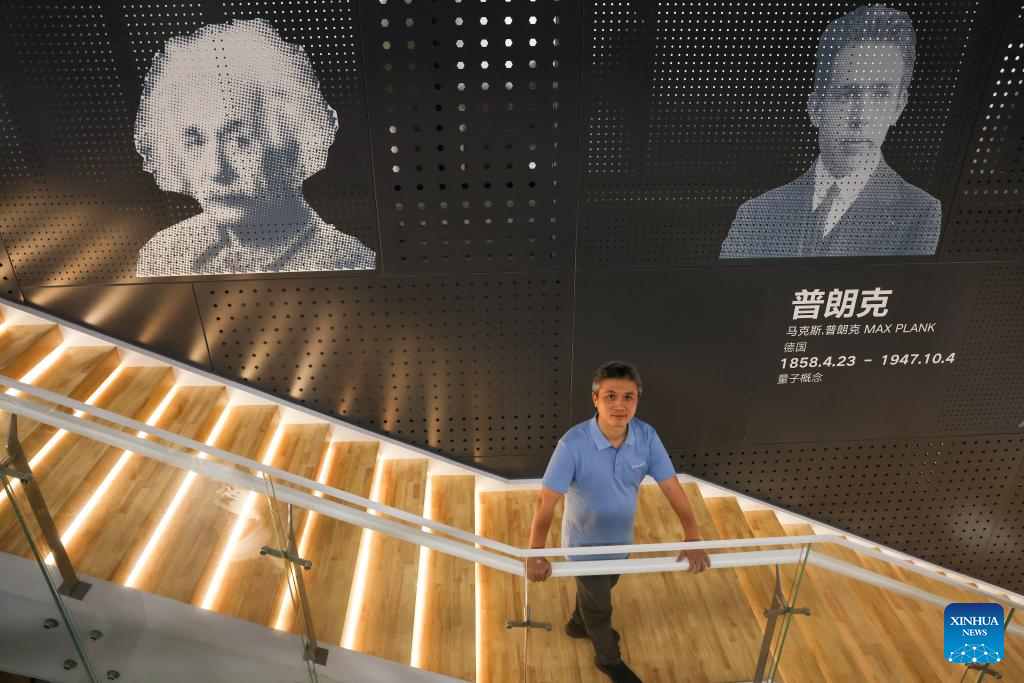
Peng Chengzhi poses for a photo at QuantumCTek Co., Ltd in Hefei, east China's Anhui Province, July 21, 2023. Peng Chengzhi, born in 1976, holds several professional positions: professor and doctoral supervisor at the University of Science and Technology of China (USTC), chief scientist of QuantumCTek Co., Ltd., and chief engineer of the scientific application system of Micius, the world's first quantum communication satellite.
Peng began to participate in the research of quantum science and technology in 2003. Since then, he has taken part in the whole process of the design of the quantum satellite "Micius", witnessing the development of China in the fields of quantum communication, quantum computing and others.
Since the USTC and QuantumCTek Co., Ltd are based in Hefei, while the Shanghai Institute for Advance Studies of USTC and Shanghai Research Center for Quantum Science are located in Shanghai, Peng often travels between the two cities for work and living.
The Yangtze River Delta integration drives the flows of talents and technologies, and provides impetus for the development of science and technology. Taking advantages of the Yangtze River Delta integration, Peng and his team are making full efforts to prepare for the launch of a new quantum satellite. (Xinhua/Jin Liwang)
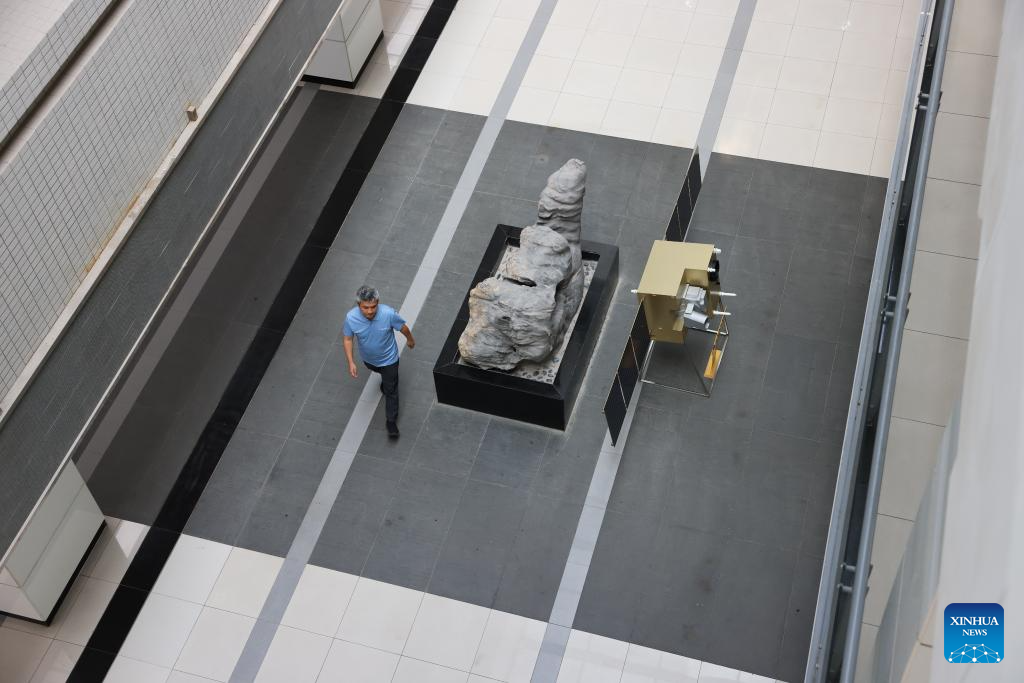
Peng Chengzhi walks past a model of quantum satellite "Micius" in the University of Science and Technology of China in Hefei, east China's Anhui Province, July 21, 2023. Peng Chengzhi, born in 1976, holds several professional positions: professor and doctoral supervisor at the University of Science and Technology of China (USTC), chief scientist of QuantumCTek Co., Ltd., and chief engineer of the scientific application system of Micius, the world's first quantum communication satellite.
Peng began to participate in the research of quantum science and technology in 2003. Since then, he has taken part in the whole process of the design of the quantum satellite "Micius", witnessing the development of China in the fields of quantum communication, quantum computing and others.
Since the USTC and QuantumCTek Co., Ltd are based in Hefei, while the Shanghai Institute for Advance Studies of USTC and Shanghai Research Center for Quantum Science are located in Shanghai, Peng often travels between the two cities for work and living.
The Yangtze River Delta integration drives the flows of talents and technologies, and provides impetus for the development of science and technology. Taking advantages of the Yangtze River Delta integration, Peng and his team are making full efforts to prepare for the launch of a new quantum satellite. (Xinhua/Jin Liwang)
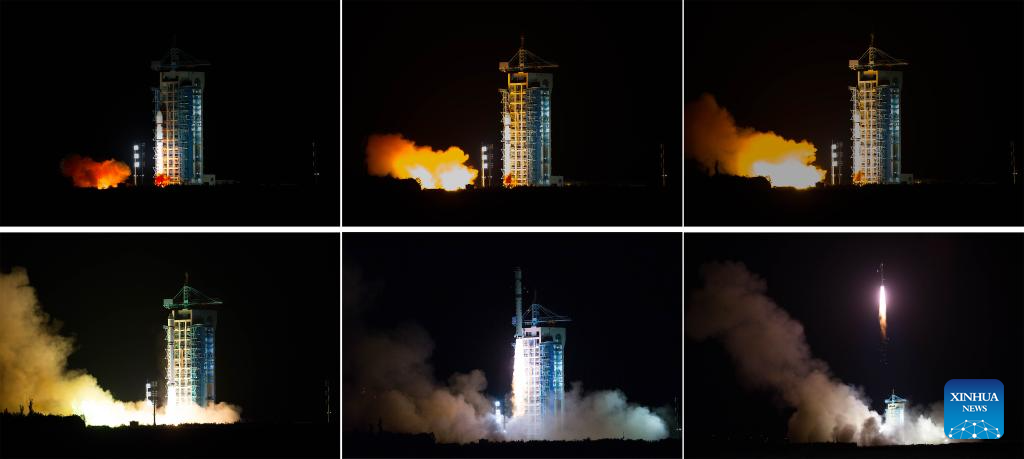
This combined photo shows China launching the world's first quantum satellite on top of a Long March-2D rocket from the Jiuquan Satellite Launch Center in Jiuquan, northwest China's Gansu Province, Aug. 16, 2016. Peng Chengzhi, born in 1976, holds several professional positions: professor and doctoral supervisor at the University of Science and Technology of China (USTC), chief scientist of QuantumCTek Co., Ltd., and chief engineer of the scientific application system of Micius, the world's first quantum communication satellite.
Peng began to participate in the research of quantum science and technology in 2003. Since then, he has taken part in the whole process of the design of the quantum satellite "Micius", witnessing the development of China in the fields of quantum communication, quantum computing and others.
Since the USTC and QuantumCTek Co., Ltd are based in Hefei, while the Shanghai Institute for Advance Studies of USTC and Shanghai Research Center for Quantum Science are located in Shanghai, Peng often travels between the two cities for work and living.
The Yangtze River Delta integration drives the flows of talents and technologies, and provides impetus for the development of science and technology. Taking advantages of the Yangtze River Delta integration, Peng and his team are making full efforts to prepare for the launch of a new quantum satellite. (Xinhua/Jin Liwang)

Peng Chengzhi walks out of the gate of the University of Science and Technology of China in Hefei, east China's Anhui Province, July 21, 2023. Peng Chengzhi, born in 1976, holds several professional positions: professor and doctoral supervisor at the University of Science and Technology of China (USTC), chief scientist of QuantumCTek Co., Ltd., and chief engineer of the scientific application system of Micius, the world's first quantum communication satellite.
Peng began to participate in the research of quantum science and technology in 2003. Since then, he has taken part in the whole process of the design of the quantum satellite "Micius", witnessing the development of China in the fields of quantum communication, quantum computing and others.
Since the USTC and QuantumCTek Co., Ltd are based in Hefei, while the Shanghai Institute for Advance Studies of USTC and Shanghai Research Center for Quantum Science are located in Shanghai, Peng often travels between the two cities for work and living.
The Yangtze River Delta integration drives the flows of talents and technologies, and provides impetus for the development of science and technology. Taking advantages of the Yangtze River Delta integration, Peng and his team are making full efforts to prepare for the launch of a new quantum satellite. (Xinhua/Jin Liwang)

This composite photo taken on Nov. 28, 2016 shows researchers making an experiment as the quantum satellite "Micius" flies over an observatory in Xinglong, north China's Hebei Province. Peng Chengzhi, born in 1976, holds several professional positions: professor and doctoral supervisor at the University of Science and Technology of China (USTC), chief scientist of QuantumCTek Co., Ltd., and chief engineer of the scientific application system of Micius, the world's first quantum communication satellite.
Peng began to participate in the research of quantum science and technology in 2003. Since then, he has taken part in the whole process of the design of the quantum satellite "Micius", witnessing the development of China in the fields of quantum communication, quantum computing and others.
Since the USTC and QuantumCTek Co., Ltd are based in Hefei, while the Shanghai Institute for Advance Studies of USTC and Shanghai Research Center for Quantum Science are located in Shanghai, Peng often travels between the two cities for work and living.
The Yangtze River Delta integration drives the flows of talents and technologies, and provides impetus for the development of science and technology. Taking advantages of the Yangtze River Delta integration, Peng and his team are making full efforts to prepare for the launch of a new quantum satellite. (Xinhua/Jin Liwang)

Peng Chengzhi talks with a student at a laboratory in the University of Science and Technology of China in Hefei, east China's Anhui Province, July 21, 2023. Peng Chengzhi, born in 1976, holds several professional positions: professor and doctoral supervisor at the University of Science and Technology of China (USTC), chief scientist of QuantumCTek Co., Ltd., and chief engineer of the scientific application system of Micius, the world's first quantum communication satellite.
Peng began to participate in the research of quantum science and technology in 2003. Since then, he has taken part in the whole process of the design of the quantum satellite "Micius", witnessing the development of China in the fields of quantum communication, quantum computing and others.
Since the USTC and QuantumCTek Co., Ltd are based in Hefei, while the Shanghai Institute for Advance Studies of USTC and Shanghai Research Center for Quantum Science are located in Shanghai, Peng often travels between the two cities for work and living.
The Yangtze River Delta integration drives the flows of talents and technologies, and provides impetus for the development of science and technology. Taking advantages of the Yangtze River Delta integration, Peng and his team are making full efforts to prepare for the launch of a new quantum satellite. (Xinhua/Qian Yi)
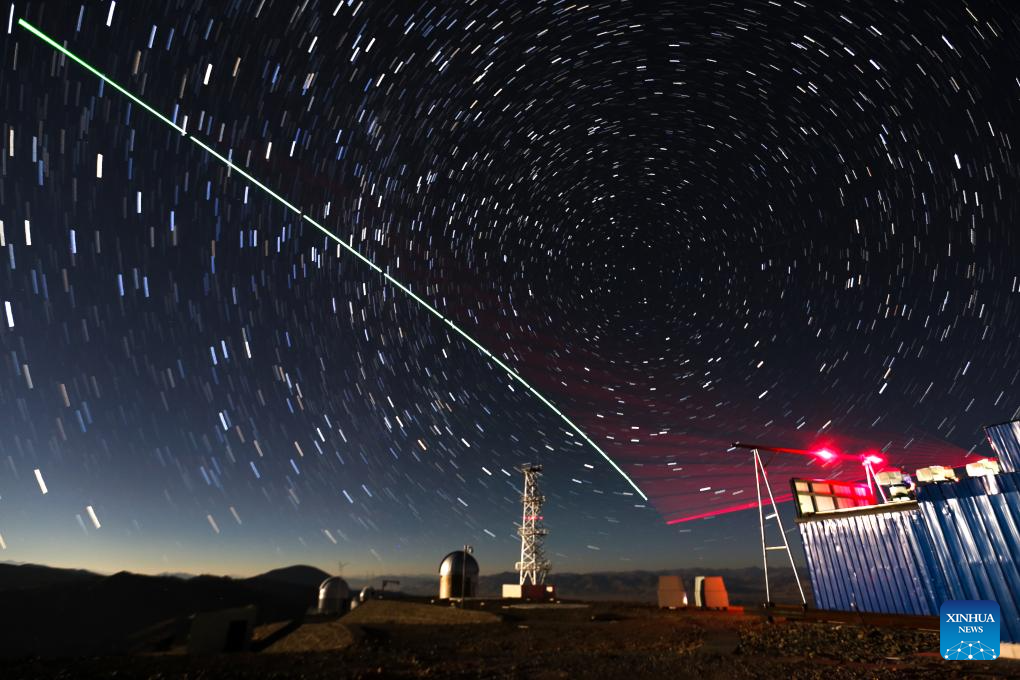
This composite photo taken on Dec. 9, 2016 shows a satellite-to-earth link established between quantum satellite "Micius" and the quantum teleportation experiment platform in Ali, southwest China's Tibet Autonomous Region. Peng Chengzhi, born in 1976, holds several professional positions: professor and doctoral supervisor at the University of Science and Technology of China (USTC), chief scientist of QuantumCTek Co., Ltd., and chief engineer of the scientific application system of Micius, the world's first quantum communication satellite.
Peng began to participate in the research of quantum science and technology in 2003. Since then, he has taken part in the whole process of the design of the quantum satellite "Micius", witnessing the development of China in the fields of quantum communication, quantum computing and others.
Since the USTC and QuantumCTek Co., Ltd are based in Hefei, while the Shanghai Institute for Advance Studies of USTC and Shanghai Research Center for Quantum Science are located in Shanghai, Peng often travels between the two cities for work and living.
The Yangtze River Delta integration drives the flows of talents and technologies, and provides impetus for the development of science and technology. Taking advantages of the Yangtze River Delta integration, Peng and his team are making full efforts to prepare for the launch of a new quantum satellite. (Xinhua/Jin Liwang)



